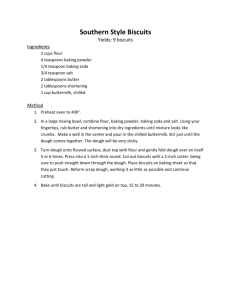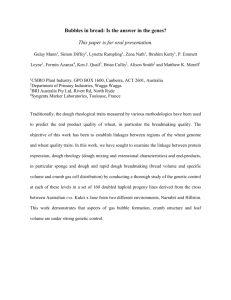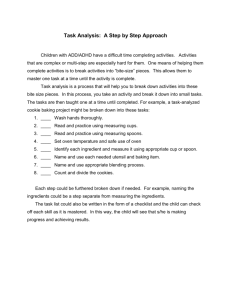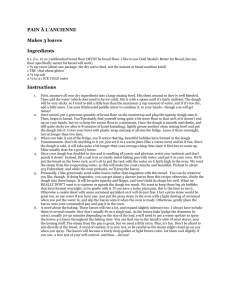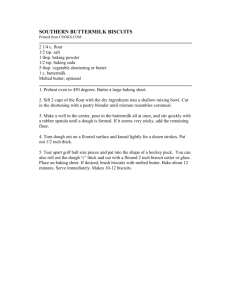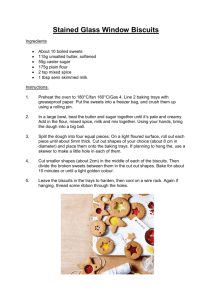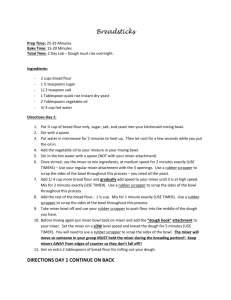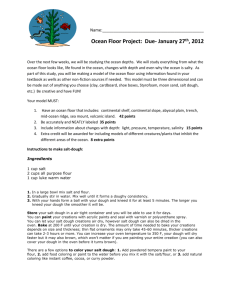FINGER FOODS: SUGGESTIONS AND RECIPES
advertisement
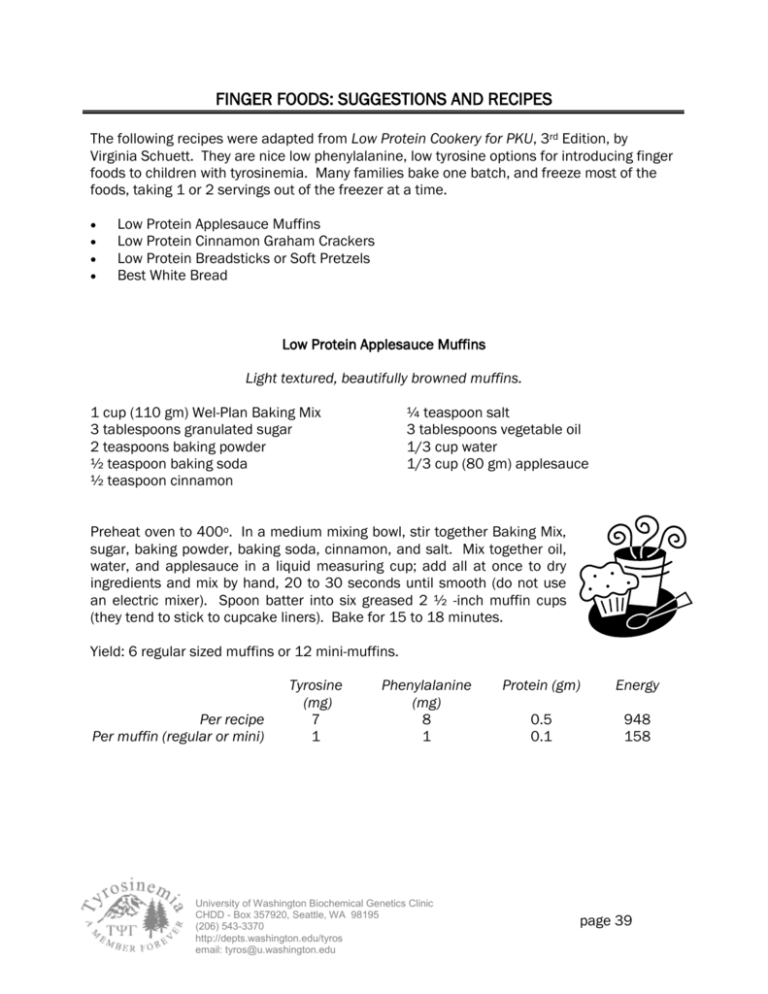
FINGER FOODS: SUGGESTIONS AND RECIPES The following recipes were adapted from Low Protein Cookery for PKU, 3rd Edition, by Virginia Schuett. They are nice low phenylalanine, low tyrosine options for introducing finger foods to children with tyrosinemia. Many families bake one batch, and freeze most of the foods, taking 1 or 2 servings out of the freezer at a time. Low Protein Applesauce Muffins Low Protein Cinnamon Graham Crackers Low Protein Breadsticks or Soft Pretzels Best White Bread Low Protein Applesauce Muffins Light textured, beautifully browned muffins. 1 cup (110 gm) Wel-Plan Baking Mix 3 tablespoons granulated sugar 2 teaspoons baking powder ½ teaspoon baking soda ½ teaspoon cinnamon ¼ teaspoon salt 3 tablespoons vegetable oil 1/3 cup water 1/3 cup (80 gm) applesauce Preheat oven to 400o. In a medium mixing bowl, stir together Baking Mix, sugar, baking powder, baking soda, cinnamon, and salt. Mix together oil, water, and applesauce in a liquid measuring cup; add all at once to dry ingredients and mix by hand, 20 to 30 seconds until smooth (do not use an electric mixer). Spoon batter into six greased 2 ½ -inch muffin cups (they tend to stick to cupcake liners). Bake for 15 to 18 minutes. Yield: 6 regular sized muffins or 12 mini-muffins. Per recipe Per muffin (regular or mini) Tyrosine (mg) 7 1 Phenylalanine (mg) 8 1 University of Washington Biochemical Genetics Clinic CHDD - Box 357920, Seattle, WA 98195 (206) 543-3370 http://depts.washington.edu/tyros email: tyros@u.washington.edu Protein (gm) Energy 0.5 0.1 948 158 page 39 Low Protein Cinnamon Graham Crackers ½ cup margarine* ½ cup packed brown sugar 1 Tbsp molasses or dark Karo corn syrup 3 Tbsp light Karo corn syrup or honey ¼ cup vegetable oil 1 box (400 gm) Wel-Plan Baking Mix 1 teaspoon baking soda 1 teaspoon cinnamon ½ teaspoon salt Preheat oven to 425o. In a large bowl, mix margarine and brown sugar until thoroughly creamed (no lumps of sugar should remain). Mix in molasses, corn syrup and/or honey, and vegetable oil until well blended. You may add 2 drops of yellow food coloring to make crackers that more closely approximate the color of commercial graham crackers. Stir together Baking Mix, baking soda, cinnamon, and salt; gradually blend into creamed mixture (dough will look very dry at first, but will become clay-like with additional mixture; work dough with your hands to this stage if you like). Divide dough into 2 parts; for each part, pat dough into a small 4- to 5- inch square on an ungreased standard size cookie sheet (13 x 11 inches) without sides. Dust with a little Baking Mix or wheat starch, then roll out evenly, to a 13 x 11-inch rectangle (dough should just fill the cookie sheet). If you have trouble with sticking, roll out dough using plastic wrap or waxed paper on top of the dough. Cut with a pizza cutter or sharp knife into 30 squares, leaving on baking sheet. You will probably have some ragged edges. Bake the ragged edges as they are; later they can be made into crumbs for a variety of uses. Optionally, prick each cracker 3 times with a fork (or so that they look like commercial crackers, score each cracker lightly down the center with a pizza cutter, being careful not to cut all the way through, then prick each half three times). Bake at 425o for 7 to 8 minutes (do not overbake; they are most like regular graham crackers when slightly underbaked; they will crisp up nicely as they cool even though soft when right from the oven). Crackers may bubble slightly in baking; press flat with a spatula right after removing them from the oven if this happens. Recut with pizza cutter while hot, if necessary. Let crackers sit on pan for a minute or two, then remove to a cooling rack. Yield: 60 crackers. Storage Tip: Store in an airtight container for up to several weeks. Crackers also freeze well. Cracker dough can be made in bulk and frozen, portions to be thawed and baked at your convenience; or dough can be made up to several days in advance, refrigerated, then baked when you have time. Variation: Use a cookie cutter to cut out fun shapes. * If using butter, add 48 mg phenylalanine and 48 mg tyrosine per recipe Per recipe Per cracker Tyrosine (mg) 18 0.3 Phenylalanine (mg) 19 0.3 University of Washington Biochemical Genetics Clinic CHDD - Box 357920, Seattle, WA 98195 (206) 543-3370 http://depts.washington.edu/tyros email: tyros@u.washington.edu Protein (gm) 2.2 Trace Energy 3345 56 page 40 Low Protein Breadsticks or Soft Pretzels 1 recipe Best White Bread or other bread recipe coarse salt melted margarine Prepare dough for Best White Bread. After the 30-minute rising, knead for 3 minutes as directed. Preheat oven to 450o. Breadsticks Cut dough into 30 small pieces (about 25 gm each). With hands, roll each piece into a rope about 6 inches long and twist with your hands to get a “corkscrew” effect. Brush each strip with a little melted margarine, then sprinkle with coarse salt. Place strips on an ungreased cookie sheet. Do not let rise a second time, but immediately bake for 15 to 18 minutes, until light golden brown. The breadsticks will be chewy-soft; if you want crispy breadsticks, dry them in a 200o oven for 30 to 45 minutes. Soft Pretzels Cut dough into 30 small pieces. With hands, roll each piece into a rope about 10 inches long. Twist into a pretzel shape, pinching ends down. Brush each pretzel lightly with melted margarine using a pastry brush and sprinkle with a little coarse salt. Place on an ungreased cookie sheet. Bake for 15 to 18 minutes, until light golden brown. Yield: 30 breadsticks or pretzels. Per recipe Per breadstick or pretzel Tyrosine (mg) 124 4 Phenylalanine (mg) 164 6 Protein (gm) 3.8 0.1 Energy 1537 51 Best White Bread ¼ cup very warm water (105 to 115) ½ teaspoon granulated sugar 1 pkg or 2 ¼ teaspoons active dry yeast (not “quick rise) Pour water into a small bowl or large coffee mug; add sugar, then yeast. Stir briefly, then let sit for 10 minutes (mixture should develop a good “head” of creamy foam on top). Meanwhile, mix together dry ingredients in a medium bowl: 3 ¼ cups (358 gm) Wel-Plan Baking Mix University of Washington Biochemical Genetics Clinic CHDD - Box 357920, Seattle, WA 98195 (206) 543-3370 http://depts.washington.edu/tyros email: tyros@u.washington.edu page 41 2 ½ Tbsp (25 gm) Metamucil 1 teaspoon salt 1 Tbsp granulated sugar When the yeast mixture is ready, pour it into a large mixing bowl. Then add: 1 cup plus 3 Tablespoons very warm water (105 to 115). Mix together the yeast and water just until well combined. Now stir in the premeasured or pre-weighed dry ingredients all at once, mixing vigorously for a few seconds until smooth (dough will remain very sticky at this point). Tightly cover bowl of dough with plastic wrap to prevent drying out. Warm oven to about 120 to 130 (very warm but not hot) by turning oven on to 350 for 1 to 2 minutes, then turning off. Place covered dough in oven and let rise for 30 minutes. Remove dough from bowl to a kneading surface dusted with Baking Mix (bread board or pastry cloth works well). Knead dough for a full 3 minutes using regular bread kneading technique. Add 2 to 4 Tablespoons (16 to 32 gm) additional Baking Mix during kneading, just enough to keep dough from sticking to hands and kneading surface. (For breadsticks or pretzels, stop here and shape dough.) Form dough into a rectangular loaf shape and place in a lightly greased 8 ½ x 4 ½ inch bread pan; cover with a cloth and set in oven, again warmed to 120 to 130. Let rise for 30 to 45 minutes, or until dough is about 1 inch above top of pan at its highest point, then remove from oven. Preheat oven to 375. Remove cloth and bake bread 15 minutes. Brush lightly with melted margarine, then continue baking for 15 to 25 minutes. Place pan on a cooling rack for several minutes, then remove bread from pan and turn on its side to cool on the rack. Let bread cool completely before cutting or storing. Yield: 15 slices Per recipe Per slice Tyrosine (mg) 124 8 Phenylalanine (mg) 164 11 Protein (gm) 3.6 0.2 University of Washington Biochemical Genetics Clinic CHDD - Box 357920, Seattle, WA 98195 (206) 543-3370 http://depts.washington.edu/tyros email: tyros@u.washington.edu Energy 1333 89 page 42
